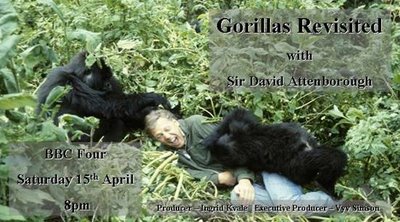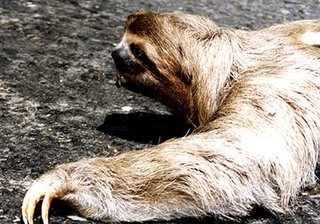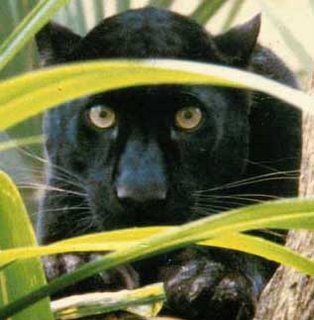NATURE: India's Blue Hills
Monday 30th October Radio 4 at 9pm
Naturalist Tessa McGregor visits India's Nilgiri Hills which turn blue every twelve years as the rare kurunji flower bursts into bloom. There she meets the rare Nilgiri tahr, half-goat, half antelope and a symbol of wild mountain habitats across the globe.
Presenter Tessa McGregor
Produced by BBC Natural History Unit,
Shared Earth
Friday 3rd November Radio 4 at 3pm
Dylan Winter takes you closer than ever to natural Britain. This week meet the eight-legged ruthless killer on your kitchen ceiling and discover how our city parks will look in 2050.
Presenter: Dylan Winter
Producer: Alasdair Cross
Plus read the Planet Earth under Threat Blog here:
http://www.bbc.co.uk/blogs/planetearthunderthreat/
27.10.06
Coast Series 2: Dover to the Isle of Wight
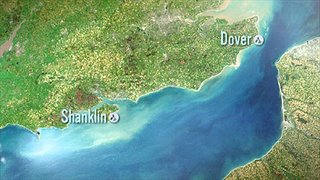 BBC2, 8pm
BBC2, 8pm4.0 million, 17.6% Audience Share
More familiar images given a fresh look cropped up in Coast (BBC Two), back for a second trip round the British Isles. This time the archaeologist Neil Oliver has replaced Nicholas Crane as principal guide but retains the affable excitement of the other friendly experts who pop up to give us a bit of biology here and history there. It’s like the ultimate school field trip without the sleepovers in draughty hostels.
This first leg took us from Dover to the Isle of Wight. I’m sure Oliver hadn’t gone all that way by foot, public transport and, last night, model railway. I bet the helicopter that delivers the kind of aerial shots we associate with CSI gave him the occasional lift. Along the way we learnt about the Victorian Channel Tunnel scuppered by public opinion, the modernist double-decker promenade and lido that drew 1930s tourists to Hastings, and Britain’s rocket- engine tests on the Isle of Wight.
Crane also turned up, his trademark umbrella protruding from his rucksack, to abseil down Beachy Head and show us how the chalk cliffs are prey to limpet acid as well as the waves. He epitomises the series’ breathless enthusiasm — at times it’s like watching a Fast Show sketch in which you expect the striding presenters to declare: “Aren’t coasts brilliant?” It was hard not to disagree.
Review from The Times - Last Night's TV by Ian Johns
BBC Homepage: http://www.bbc.co.uk/coast/
26.10.06
Wildscreen 2006 Presentation by Paul Williams
Wildscreen 2006: Breaking out of the box
This summary is not available. Please
click here to view the post.
25.10.06
Natural World: On the trail of Tarka
 TONIGHT 8PM - BBC 2
TONIGHT 8PM - BBC 2(and repeated again on Sunday 29th October 6.10pm - BBC 2)
No one has ever succeeded in making a film about Britain’s river otters…until now. Award winning filmmakers Charlie Hamilton James and Philippa Forrester went in search of otters on a short stretch of the River Torridge in Devon, immortalized eighty years ago by Henry Williamson in his famous novel Tarka the Otter. Over months of patient fieldwork they got to know a family of wild otters and filmed the kind of intimate footage that had always been thought impossible. The result is both a lyrical portrait of these shy creatures, and a tribute to Williamson’s skills as a writer and naturalist.
Produced by - Philippa Forrester & Charlie Hamilton James
Photography - Charlie Hamilton James & Jamie McPherson
Series Editor - Tim Martin
AS PART OF THE BBC BROADBAND TRIAL THIS PROGRAMME CAN BE VIEWED AGAIN OVER THE NEXT WEEK BY VISITING:
http://www.bbc.co.uk/bbctwo
Digging Deep
 18/10/2006, BBC 2 8:30pm
18/10/2006, BBC 2 8:30pm1.8 million, 8.1% audience share
Guardian Features Pages, Sam Wollaston:
In television's quest to find new ways of dealing with subjects that have been done to death, someone has come up with Digging Deep (BBC2). Amanda and Andre aren't simple gardeners, oh no, they're horticultural therapists. They'll turn up with an inexhaustible supply of the word "darling" and rolls of material that they'll drape around your back yard, testing it for mood and colour. If you've recently suffered some sort of trauma, they'll create you a healing garden. If you need stimulation, they'll make you something to get you going. They'd probably make Isabelle a new face garden if she wanted one. It doesn't matter what state of mind you're in, Amanda and Andre know how to create a garden to meet your emotional needs. They're actually more like doctors than gardeners.
BBC Press Release:
Digging Deep
Garden designers Andre Smith and Amanda Brooks offer a unique service. They make gardens for the soul – horticultural therapists, if you will. Their stunning garden designs aim to have a transformative effect upon the owner, improving their emotional well-being.
Each episode focuses on the hidden psychological reasons behind the neglected hedges and entangled borders of a garden which is then transformed into the owner's personal Eden.
Having worked together for eight years, Andre and Amanda have very clear ideas about their designs and aim to produce a beautiful, flourishing garden that reflects the character and needs of its owner. Their philosophy is to get the owner involved, reacquainting them with nature and the sensual pleasure of gardening.
24.10.06
WILD THING: I LOVE YOU
 Channel 4 Sunday 4.50PM
Channel 4 Sunday 4.50PM1.1 million, 6.6% Audience Share
When you think of Bill Bailey the words 'wildlife enthusiast' probably aren't the first things to come to mind, but the comedian is on top form as he heads up a team of experts attempting to solve a new wildlife crisis each week. In all honesty, the experts do most of the work, but Bailey proves an amiable, knowledgeable and entertaining guide.
From The Observer - 15/10/2006
Observer TV and Radio Sarah Hughes
Bill Bailey continues on his mission to help wild creatures out of tricky situations. Tonight, he and his team construct a sett for some Staffordshire badgers whose habitat is about to be destroyed by a newhousing development.
Incredible Animal Journeys: Osprey Odyssey
 BBC 1 8pm, 22/10/06
BBC 1 8pm, 22/10/064 million, 16.5%
From Radio Times:
Documentary series about some of the more amazing journeys taken by certain species. The sun is shining as Steve Leonard sets off to travel with three young ospreys, Bunga, Tasha and Jaws, on their first ever 3,000 mile migration from North to South America, via Cuba. Within days man and birds are battling with a hurricane, one bird is dead and the others scattered. After that, things start to get really difficult... will the remaining birds survive, and can Steve keep up?
20.10.06
SUPER VETS
 7.00PM BBC 1 (30mins)
7.00PM BBC 1 (30mins)3.6 MILLION, 18.5% AUDIENCE SHARE
Radio Times Choice, By David Butcher
After Vet Safari took us wheeling around the African bush, this series brings us more tales of cutting edge (often literally) animal medicine, only this time in the cosier setting of home counties.
There's no shortage of heart-tugging drama, mind: tonight we have a critically ill foal called Buddy, whose mother is showing all the maternal feeling of Little Britian's Vicky Pollard; a cute puppy called Bindy who needs brain surgery; and an elderly chimp (she's 42) with "high left atrial pressures, incidental ASD and aortic regurgitation" - in layman's terms, a dodgy ticker. It's all slickly filmed, as emotionally ruthless as a Spielberg movie and, if you're pet-minded, hard to resist.
For more information visit the series website: http://www.rvc.ac.uk/SuperVets/
19.10.06
BBC Climate Change Experiment
"We need the computer power you're not using."
An experiment developed for the BBC by climate scientists, led by Oxford University, using the Met Office climate model
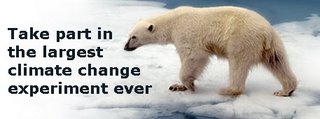
What does the experiment do?
The experiment adds the processing power of your home or office computer to thousands of others to predict climate change. The same model that the Met Office uses to make daily weather forecasts has been adapted by climateprediction.net to run on home PCs.
The model incorporates many variable parameters, allowing thousands of sets of conditions. Your computer will run one individual set of conditions – in effect your individual version of how the world's climate works – and then report back to the climateprediction.net team what it calculates.
Find out more about the experiment HERE

An experiment developed for the BBC by climate scientists, led by Oxford University, using the Met Office climate model

What does the experiment do?
The experiment adds the processing power of your home or office computer to thousands of others to predict climate change. The same model that the Met Office uses to make daily weather forecasts has been adapted by climateprediction.net to run on home PCs.
The model incorporates many variable parameters, allowing thousands of sets of conditions. Your computer will run one individual set of conditions – in effect your individual version of how the world's climate works – and then report back to the climateprediction.net team what it calculates.
Find out more about the experiment HERE

Gorillas Revisted
April 15th 2006, BBC4
Sir David Attenborough’s encounter with Mountain gorillas, during the filming of Life on Earth, is one of the greatest moments in television history.
In this journey of re-discovery Sir David recounts his incredible and very personal experiences with Rwanda’s Mountain gorillas. The aim – to update us on their progress and uncover the gripping tale of how Mountain gorillas have survived extinction against all the odds. There are few great success stories in conservation today - but this really is one of them.
Production Team
Exec: VYV SIMSON
Producer: INGRID KVALE
Researcher: GAVIN BOYLAND
Production Co-ordinator: LEA ALDRIDGE
Production Manager: RUTH FLOWERS
Editor: STEVE PHILLIPS
Photography: ERIC HUYTON & TONY MILLER
Sound Recordist: FRASER BARBER
Composer: RICHARD ATTREE
Sir David Attenborough’s encounter with Mountain gorillas, during the filming of Life on Earth, is one of the greatest moments in television history.
In this journey of re-discovery Sir David recounts his incredible and very personal experiences with Rwanda’s Mountain gorillas. The aim – to update us on their progress and uncover the gripping tale of how Mountain gorillas have survived extinction against all the odds. There are few great success stories in conservation today - but this really is one of them.
Production Team
Exec: VYV SIMSON
Producer: INGRID KVALE
Researcher: GAVIN BOYLAND
Production Co-ordinator: LEA ALDRIDGE
Production Manager: RUTH FLOWERS
Editor: STEVE PHILLIPS
Photography: ERIC HUYTON & TONY MILLER
Sound Recordist: FRASER BARBER
Composer: RICHARD ATTREE
NATURAL WORLD: The Last Lions of India
BBC Two, 8pm
Audience: 2 million, 9.1% Audience Share
The Times - 18/10/2006, David Chater:
A new series of The Natural World is always welcome because it means that, at least once a week, there will be one programme filled with beauty and wonder. The first in the series features the ancient lions of western India, who came perilously close to extinction when, in 1901, the Nawab of Junagadh invited Lord Curzon to a hunt - only to discover that there were just 20 lions left. Rather than shooting them, he enforced a conservation order that allowed them to make a remarkable comeback.
These were the lions of Ancient Greece and the Bible -the lions that Androcles and Daniel faced -which are very different from their African cousins in both habit and appearance. They now live alongside the equally ancient Maldhari tribe, whose way of life has remained unchanged for centuries.
Audience: 2 million, 9.1% Audience Share
The Times - 18/10/2006, David Chater:
A new series of The Natural World is always welcome because it means that, at least once a week, there will be one programme filled with beauty and wonder. The first in the series features the ancient lions of western India, who came perilously close to extinction when, in 1901, the Nawab of Junagadh invited Lord Curzon to a hunt - only to discover that there were just 20 lions left. Rather than shooting them, he enforced a conservation order that allowed them to make a remarkable comeback.
These were the lions of Ancient Greece and the Bible -the lions that Androcles and Daniel faced -which are very different from their African cousins in both habit and appearance. They now live alongside the equally ancient Maldhari tribe, whose way of life has remained unchanged for centuries.
18.10.06
The Last Lions of India
 The First Natural World of the Season.
The First Natural World of the Season.This is the story of an Indian big cat that’s doing rather well, unlike the tiger, yet few people know it exists. Asiatic lions are completely different from African lions in both appearance and behaviour. These lions once roamed Europe – they are the lions of Ancient Greece and Rome, the lions in The Bible. Their refuge is the beautiful Gir forests, which they share with peacocks, antelope, leopards, and cattle belonging to the local Maldari tribe. After a century of protection the lions have bounced back from less than twenty to over three hundred - proof that big cats and people can live side by side.
Producer - Harry Marshall
Executive Producer - Laura Marshall
Series Editor - Tim Martin
AS PART OF THE BBC BROADBAND TRIAL THIS PROGRAMME CAN BE VIEWED AGAIN OVER THE NEXT WEEK BY VISITING:
http://www.bbc.co.uk/bbctwo
Galapagos: Forces of Change
13/10/06, BBC 2 9pm
3 million, 13.6% Audience Share
Here's an interesting review not only of Galapagos, but also of the BBC Natural History Unit.
The origin of a new species?: Television
The Sunday Times - 15/10/2006
Mother nature can be a cruel and spiteful old mama. Come with me, let us look at the strange and complex gestation of the natural history film. Its first mating rituals happen in secluded offices, often in Bristol; nobody knows why nature films chose Bristol for their colony. The film-makers are dull, socially inept, secretive little creatures. Their mating rituals take place across continents, finding partners from the National Geographic and Discovery channels; their displays involve the waving of money. Then, years later, after unimaginable hardship, danger, boredom and unwashed underpants, miles and miles of incoherent film are born. The young are called rushes; they stay close to their parents, the film-makers, who make the perilous journey back to Bristol, where the young slowly grow into full-size films. There they live for a brief moment of flashy life, flitting across the screen in your living room, before disappearing for ever.
A few will live on in ancient repeats on the unvisited reaches of the Sky box and the too-frightened-to-sleep entertainment selection on British Airways.
Natural history documentaries are some of the most popular creatures on television, and, paradoxically, as real nature hurtles to extinction, so natural history films prosper and flourish. Naturalists have predicted that in the event of a global nuclear catastrophe, the only inhabitants left on earth would be cockroaches and a documentary crew making a film about cockroaches. Bearing in mind the unspeakable misery, filth, disgusting food, rudimentary dens and risible pay that must have been endured by Paul and Richard, the cameramen of Galapagos (Friday, BBC2), I think we should all share a moment's silence of commiseration because of what their rushes finally grew up to be. Galapagos is one of the most beautiful, strikingly shot nature films I've ever seen, in the finest tradition of Bristol and the BBC Natural History Unit. But they've put a voice-over on, emoted by Tilda Swinton ("spoken" would be too small and brown a word for what she does with her voice).
Now, we're used to people with funny accents talking about nature: the immortal Jacques Cousteau, Armand and Michaela Denis, the high-pitched whining of Bill Oddie. But no film could stand up against the tremulous, emotion-filled, ultra-thespian enunciation of Miss Swinton, and that's before we even get to what she is reading -a script of startlingly saccharine, purple-mood words, as informative as the collected lyrics of Enya. It's been written by someone with a "well-thumbed" cliche dictionary, to a background tune that sounds like music to eat muesli by. A potentially memorable documentary has been turned into the television equivalent of a Hallmark card; it was like dressing an iguana in a tutu, or painting polka dots on a tortoise. I dare anyone at the BBC to tell me the look and hideous kitsch gloss of these films had nothing to do with the co-production money from the National Geographic channel. Anyway, to Paul and Richard: better luck next time.
3 million, 13.6% Audience Share
Here's an interesting review not only of Galapagos, but also of the BBC Natural History Unit.
The origin of a new species?: Television
The Sunday Times - 15/10/2006
Mother nature can be a cruel and spiteful old mama. Come with me, let us look at the strange and complex gestation of the natural history film. Its first mating rituals happen in secluded offices, often in Bristol; nobody knows why nature films chose Bristol for their colony. The film-makers are dull, socially inept, secretive little creatures. Their mating rituals take place across continents, finding partners from the National Geographic and Discovery channels; their displays involve the waving of money. Then, years later, after unimaginable hardship, danger, boredom and unwashed underpants, miles and miles of incoherent film are born. The young are called rushes; they stay close to their parents, the film-makers, who make the perilous journey back to Bristol, where the young slowly grow into full-size films. There they live for a brief moment of flashy life, flitting across the screen in your living room, before disappearing for ever.
A few will live on in ancient repeats on the unvisited reaches of the Sky box and the too-frightened-to-sleep entertainment selection on British Airways.
Natural history documentaries are some of the most popular creatures on television, and, paradoxically, as real nature hurtles to extinction, so natural history films prosper and flourish. Naturalists have predicted that in the event of a global nuclear catastrophe, the only inhabitants left on earth would be cockroaches and a documentary crew making a film about cockroaches. Bearing in mind the unspeakable misery, filth, disgusting food, rudimentary dens and risible pay that must have been endured by Paul and Richard, the cameramen of Galapagos (Friday, BBC2), I think we should all share a moment's silence of commiseration because of what their rushes finally grew up to be. Galapagos is one of the most beautiful, strikingly shot nature films I've ever seen, in the finest tradition of Bristol and the BBC Natural History Unit. But they've put a voice-over on, emoted by Tilda Swinton ("spoken" would be too small and brown a word for what she does with her voice).
Now, we're used to people with funny accents talking about nature: the immortal Jacques Cousteau, Armand and Michaela Denis, the high-pitched whining of Bill Oddie. But no film could stand up against the tremulous, emotion-filled, ultra-thespian enunciation of Miss Swinton, and that's before we even get to what she is reading -a script of startlingly saccharine, purple-mood words, as informative as the collected lyrics of Enya. It's been written by someone with a "well-thumbed" cliche dictionary, to a background tune that sounds like music to eat muesli by. A potentially memorable documentary has been turned into the television equivalent of a Hallmark card; it was like dressing an iguana in a tutu, or painting polka dots on a tortoise. I dare anyone at the BBC to tell me the look and hideous kitsch gloss of these films had nothing to do with the co-production money from the National Geographic channel. Anyway, to Paul and Richard: better luck next time.
Autumnwatch
Wednesday, 11th October, BBC 2 @ 8pm
Audience: 3.7m 15.9%
(1 Hour programme)
Sam Wollaston (Guardian):
Autumnwatch With Bill Oddie (BBC2)! Isn't it brilliant - the geese, the seal pups, the white hares? Maybe this isn't such a bad place to live after all. I know it was the night before last, but did you see the big fight between Percy and Brutus, the rutting stags on the island of Rum? "This is the fight we hoped was never going to happen," said Simon King, the deer man. You big liar, Simon, you were just as excited as the rest of us.
And so cheeky young Brutus challenged big Percy for the crown. It looked like sheer folly: he's smaller, less experienced, and Percy started to butt the crap out of him. But Brutus edged his way back into it, using his skill and speed to outsmart the old prize-fighter. Then he landed a couple of killer blows, and suddenly Percy was running for the hills. Fantastic - just like Cassius Clay's world heavyweight fight with Sonny Liston in 1964.
Audience: 3.7m 15.9%
(1 Hour programme)
Sam Wollaston (Guardian):
Autumnwatch With Bill Oddie (BBC2)! Isn't it brilliant - the geese, the seal pups, the white hares? Maybe this isn't such a bad place to live after all. I know it was the night before last, but did you see the big fight between Percy and Brutus, the rutting stags on the island of Rum? "This is the fight we hoped was never going to happen," said Simon King, the deer man. You big liar, Simon, you were just as excited as the rest of us.
And so cheeky young Brutus challenged big Percy for the crown. It looked like sheer folly: he's smaller, less experienced, and Percy started to butt the crap out of him. But Brutus edged his way back into it, using his skill and speed to outsmart the old prize-fighter. Then he landed a couple of killer blows, and suddenly Percy was running for the hills. Fantastic - just like Cassius Clay's world heavyweight fight with Sonny Liston in 1964.
10.10.06
Galapagos: Islands that changed the world
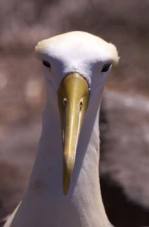 BBC2 Friday 6th October
BBC2 Friday 6th October(3.1 million, 15% Audience Share)
It was on Galapagos that a 26-year-old Charles Darwin had his initial eureka moment into the theory of evolution that was to utterly change the way we view our place in the world. The second part of this eye-popping documentary touches on Darwin's first and only visit to these islands. At the time he wrote: "Nothing could be less inviting. Nothing more rough and horrid."
The real draw is the incredible wildlife photography of sights like the male frigate birds with inflatable red throat pouches which double as pillows. And if you've always had a soft-spot for owls, be prepared for a bit of a shock as they're revealed here to be the muggers of the animal world. On one of the islands, short-eared owls hunt for storm petrels by lurking just inside their burrows and waiting for the little birds to return home before pouncing. The brutes!
Incredible Animal Journeys: In the Footsteps of the Ice Bear
 BBC 1, 8pm Sunday
BBC 1, 8pm Sunday(4.3 million, 17.4% Audience Share)
Incredible Animal Journeys (BBC1, Sunday) and the frozen wastes of Svalbard, where hunky Steve Leonard is looking for a polar bear called Aurora. She shouldn't be too hard to find, as she's wearing a GPS transmitter on her collar, but it still takes him most of the programme to track her down. In the meantime, Steve gets to show us how brave he is (by avoiding ice falling from crumbling glaciers, and being chased by walruses), and how hunky he is (by allowing us into his cabin when he's got his top off). We even meet a couple of polar bears who aren't Aurora. Aurora's worth the wait though, because she's got a little cub with her. Surely there's nothing in the world as lovely as a baby polar bear, even if their mums are highly likely to bite your head off.
Example Audience log: Felt that Steve Leonard was an excellent presenter. "He made me feel as though I was there with him, he is an natural presenter."
6.10.06
The Abyssal Giant: Great Ocean Adventure
 Five, 7.15pm, 13/10/05
Five, 7.15pm, 13/10/05Audience: 0.7m, 3.2%
Radio Times
Marine Biologist Monty Halls embarks on an exciting quest to swim with some of the most magnificent sea creatures in the world's oceans. With a potential wing-span of 24 feet and weighing up to a ton and a half, manta rays are arguably the most awesome and graceful aquatic giants. Monty heads to Revillagigedo archipelago in the Pacific Ocean for what will be a truly epic encounter.
5.10.06
The Dark Side Of Elephants
Underground Britain; the Hippo Hunters
Audience: 1.2m 5.9%
Broadcast: 11/10/05
Big Game hunting is big business, and for the right price you can shoot virtually any animal on the planet. There's something for all budgets - a baboon can be shot for £150, zebra for £600, giraffe for £2,500, right up to an elephant and lion combo for £30,000. Although killing these animals is legal, its a secretive world, but filmmakers Alastair Cook and Robert Davis managed to persuade two hunters to take part in this documentary - and in a bizarre coincidence, they were both after the same animal; a hippo.

Broadcast: 11/10/05
Big Game hunting is big business, and for the right price you can shoot virtually any animal on the planet. There's something for all budgets - a baboon can be shot for £150, zebra for £600, giraffe for £2,500, right up to an elephant and lion combo for £30,000. Although killing these animals is legal, its a secretive world, but filmmakers Alastair Cook and Robert Davis managed to persuade two hunters to take part in this documentary - and in a bizarre coincidence, they were both after the same animal; a hippo.

4.10.06
T-Rex: A Dinosaur In Hollywood
 Audience: 2.1m, 9.5%
Audience: 2.1m, 9.5%BBC One, 8pm 6/10/05
Times Online:
One hundred years ago, the palaeontologist Barnum Brown discovered a vast dinosaur in the Badlands of Montana that had lain hidden for 65 million years. When the skeleton was exhibited in New York, women are said to have fainted. Even the name it was given, Tyrannosaurus Rex ("the tyrant-lizard king") smacked of showbiz. Here was a monster destined for a career in the movies, and this droll documentary shows how T-Rex took Hollywood by storm. It is a highly entertaining treatment of the subject, filled with wacky contributors and appearances from the dinosaur star himself.
Polar Bear Alcatraz
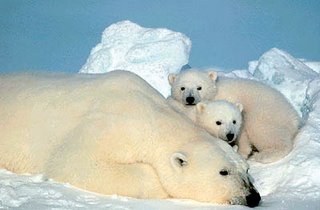 Nat Geo: Sat 1st Oct 2005
Nat Geo: Sat 1st Oct 2005Audience: 11,000
The polar bear is the biggest land predator of them all. So imagine being marooned on an Arctic island, with the highest density of polar bears anywhere on the planet. Two men are willing to do just that. And to this tale of survival is added the touching story of an orphaned cub which is forced to go it alone in a world of ice. Time and again, the bears test the men's endurance as they explore the majesty and splendour of the polar bear at its most wild and raw.
Killer Shark Live
Audience: 1.7m, 7.0% 3/10/05
1.0m, 4.2% on 4/10/05
Channel Five, 8pm

Times Online
Since these programmes go out live over the next seven days, it is difficult to know whether the presenters Donal MacIntyre and Nick Baker will go swimming with sharks. One can but hope. But we do know the programmes will be broadcast from a diving boat off the Californian coast and the Scripps Institute of Oceanography in San Diego and involve scientific experiments and commentary from shark behaviourists.
In case you’re thinking this is all a bit earnest, don’t worry. It’s still Five. Every night, the publicity blurb promises there will be footage of shark attacks from around the world, including "Heather Boswell’s leg severed when she was bitten off the coast of Chile, and an Australian great white shark ripping the leg off a teenage girl on a Lilo". There’s one for the diary.
Radio Times
Tonight wildlife expert Nick Baker, anchored in shark-infested waters in the Pacific Ocean, attempts to tag a Great White with a purpose-built camera for a world first - "shark cam". And another world first, the autopsy of a Tiger Shark. Presented by Donal MacIntyre live from San Diego.
1.0m, 4.2% on 4/10/05
Channel Five, 8pm

Times Online
Since these programmes go out live over the next seven days, it is difficult to know whether the presenters Donal MacIntyre and Nick Baker will go swimming with sharks. One can but hope. But we do know the programmes will be broadcast from a diving boat off the Californian coast and the Scripps Institute of Oceanography in San Diego and involve scientific experiments and commentary from shark behaviourists.
In case you’re thinking this is all a bit earnest, don’t worry. It’s still Five. Every night, the publicity blurb promises there will be footage of shark attacks from around the world, including "Heather Boswell’s leg severed when she was bitten off the coast of Chile, and an Australian great white shark ripping the leg off a teenage girl on a Lilo". There’s one for the diary.
Radio Times
Tonight wildlife expert Nick Baker, anchored in shark-infested waters in the Pacific Ocean, attempts to tag a Great White with a purpose-built camera for a world first - "shark cam". And another world first, the autopsy of a Tiger Shark. Presented by Donal MacIntyre live from San Diego.
Animal Crime Scene - Amazon Assassin
Audience: 2.4m, 10.9%
BBC 26/09/05
Radio Times:
A three toed sloth lies dead in the Amazon jungle and the suspects for this killing range from deadly jaguars and killer bees or crafty boa constrictors. But all is not what it seems. Can you get to the truth and identify the true culprit before David Attenborough reveals all?
Animal Crime Scene: African Assassin
TIOTI: Tape It Of The Internet
Here's a new web service that looks like it will help to define what web2.0 is all about: "Tape it off the internet" http://tapeitofftheinternet.com/
One of its aims is to break down the huge variations in global release schedules, so we no longer have to wait months for the next series of Lost when the USA has already had it.
I can't wait to have a play when it goes live in a couple of weeks as does look like it could be very interesting as far as how broadcasters reach our audiences - sharing TV socially over the internet. How do producers get their programmes accepted in an online community? How do they reach any audience when the audience is creating peer-reviewed shedules?

One of its aims is to break down the huge variations in global release schedules, so we no longer have to wait months for the next series of Lost when the USA has already had it.
I can't wait to have a play when it goes live in a couple of weeks as does look like it could be very interesting as far as how broadcasters reach our audiences - sharing TV socially over the internet. How do producers get their programmes accepted in an online community? How do they reach any audience when the audience is creating peer-reviewed shedules?

Meerkat Manor
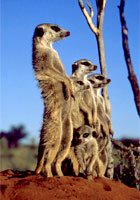 Animal Planet, 7.30pm, 12/09/2005
Animal Planet, 7.30pm, 12/09/2005Natural history as soap opera — cameras follow a group of meerkats (the little cuties) in the Kalahari Desert, from family squabbles to love affairs. Bill Nighy narrates. Times Online
Wikipedia:
Meerkat Manor is a Discovery Channel Animal Planet series shown successfully worldwide. It is a series in the style of a soap opera about a mob of meerkats that are part of a ten-year study by the Cambridge University. The show is narrated by Bill Nighy in the UK, Mike Goldman in Australia, and Sean Astin in the USA. The series was originally shown in the UK, and is its primary home, but because it became widely popular, the series was picked up in Australia, then the United States, and is now a worldwide hit.
Extraordinary Pets
Audience: 1.2m, 5.8%
Five, 8pm, 30/08/2005
 Review by Sam Wollaston, The Guardian
Review by Sam Wollaston, The Guardian
"In Extraordinary Pets USA (Five), I like the man who lives high in the Pennsylvania hills in a house he shares with lots of crocodiles. One of them, a dirty great monster, sits on the kitchen floor with a smile that seems to say "bring me my dinner now, unless you want to become my dinner".
My favourite of all though is Adam in Florida. Adam showers with his pet, Titan. They lather up together - Johnson & Johnson is both Adam's and Titan's favourite shampoo. Adam is a Bengal tiger. I think you have to be quite confident about your masculinity to shower with a Bengal
tiger."
Five, 8pm, 30/08/2005
 Review by Sam Wollaston, The Guardian
Review by Sam Wollaston, The Guardian"In Extraordinary Pets USA (Five), I like the man who lives high in the Pennsylvania hills in a house he shares with lots of crocodiles. One of them, a dirty great monster, sits on the kitchen floor with a smile that seems to say "bring me my dinner now, unless you want to become my dinner".
My favourite of all though is Adam in Florida. Adam showers with his pet, Titan. They lather up together - Johnson & Johnson is both Adam's and Titan's favourite shampoo. Adam is a Bengal tiger. I think you have to be quite confident about your masculinity to shower with a Bengal
tiger."
Deep Blue
Viewing Figures: 4.7m, 20.4%
Date: 6th September 2005
Radio Times Review
Filmed over three years in dozens of locations, including Antarctica, the Maldives, Cayman Islands and Azores, David Attenborough's BBC television series The Blue Planet provided a visually striking and occasionally harrowing insight into the staggering diversity of marine life that populates the oceans. This offshoot film is excerpts from that series edited together - it loses Attenborough's narrative, allowing viewers to sit back and appreciate the astounding cinematography with little interruption. A sense of ever-present danger pervades the footage of dolphins, penguins, seals and baby whales, even when they are engaged in play, but it's the bizarre inhabitants of the seemingly more tranquil world 5,000 metres below the surface that really catch the eye. It's a shame that Michael Gambon's few moments of commentary couldn't have been more informative, but the images, especially those of the more ethereal ocean-floor species that had never been seen before, are magnificent.
Date: 6th September 2005
Radio Times Review
Filmed over three years in dozens of locations, including Antarctica, the Maldives, Cayman Islands and Azores, David Attenborough's BBC television series The Blue Planet provided a visually striking and occasionally harrowing insight into the staggering diversity of marine life that populates the oceans. This offshoot film is excerpts from that series edited together - it loses Attenborough's narrative, allowing viewers to sit back and appreciate the astounding cinematography with little interruption. A sense of ever-present danger pervades the footage of dolphins, penguins, seals and baby whales, even when they are engaged in play, but it's the bizarre inhabitants of the seemingly more tranquil world 5,000 metres below the surface that really catch the eye. It's a shame that Michael Gambon's few moments of commentary couldn't have been more informative, but the images, especially those of the more ethereal ocean-floor species that had never been seen before, are magnificent.
Bite Night: Celebrity Shark Bait
Audience: 3.6m, 16.4%
Date: 5th September 2005
 Radio Times review:
Radio Times review:
This isn't as awful as you might expect. In fact, it's quite good fun. The participants are a nicely mixed bunch. Richard E Grant, Ruby Wax, Colin Jackson and Amy Nuttall (from Emmerdale) all seem to take the challenge of coming face to face with a great white shark quite seriously. In fact, it's a lifelong ambition of Grant's. The quartet is flown to South Africa. Grant and Wax are both experienced divers, while Nuttall and Jackson need training. They all watch scary footage of sharks attacking shark cages of the type they'll be using, before everyone heads out to so-called Shark Alley. Frankly, there's a lot of preamble for a fairly short diving and sharkwatching sequence, though the underwater shots are worth seeing.
Date: 5th September 2005
 Radio Times review:
Radio Times review:This isn't as awful as you might expect. In fact, it's quite good fun. The participants are a nicely mixed bunch. Richard E Grant, Ruby Wax, Colin Jackson and Amy Nuttall (from Emmerdale) all seem to take the challenge of coming face to face with a great white shark quite seriously. In fact, it's a lifelong ambition of Grant's. The quartet is flown to South Africa. Grant and Wax are both experienced divers, while Nuttall and Jackson need training. They all watch scary footage of sharks attacking shark cages of the type they'll be using, before everyone heads out to so-called Shark Alley. Frankly, there's a lot of preamble for a fairly short diving and sharkwatching sequence, though the underwater shots are worth seeing.
Seawatch
Autumnwatch

Bill, Kate & Simon, Autumnwatch Team.
Some audience figure information… (Guardian)
TV overnights: BBC2 wildlife show Autumnwatch debuted with an impressive 3.8m viewers, matching the success of Springwatch earlier in the year. By Chris Tryhorn.
BBC2 wildlife show Autumnwatch debuted with an impressive 3.8 million viewers last night, matching the success of Springwatch earlier in the year.
The programme, hosted by Bill Oddie, had a 17% share of the audience between 8pm and 9pm, putting it level with Tonight with Trevor McDonald on ITV1 in the first half of the hour.
Both programmes were up against BBC1's EastEnders, which attracted 8.5 million viewers, a 38% share, according to unofficial overnights.
In its second half-hour, Autumnwatch faced the second Monday instalment of Coronation Street, which took 9.1 million viewers and a 38% share.
Autumnwatch runs nightly at 8pm for the next two weeks, following Oddie and co-presenter Kate Humble as they look for animal activity from their base at the Martin Mere nature reserve in Lancashire.
3.10.06
Galapagos
Audience: (3.2m 15.2%)
Date: Friday, 27th October, BBC 2 @ 9pm
Review from the Daily Telegraph
 For those of us who know far too little about the volcanic islands off the coast of Ecuador, Galapagos (BBC2, Fri) was a revelation. Living up to the high standards of natural-history camerawork, this had a painterly beauty, but its defining character was the narration of Tilda Swinton, which treated the words as if they were poetry and gave the whole film a haunting feel.
For those of us who know far too little about the volcanic islands off the coast of Ecuador, Galapagos (BBC2, Fri) was a revelation. Living up to the high standards of natural-history camerawork, this had a painterly beauty, but its defining character was the narration of Tilda Swinton, which treated the words as if they were poetry and gave the whole film a haunting feel.
"Where the volcano meets the sea, dragons stir,'' Swinton said with perfect diction as the world's only marine iguana dived from the cliffs into turbulent sea. Landlubbers when their ancestors arrived, they now swim down 30 feet to eat algae and, on their way back, they have to fight off a load of seals who want to play (not now!). This documentary also showed that geography is not a dusty thing of latitudes and isobars, but the study of a profound mystery. On the ocean bed a tunnel to the earth's core spouts volcanic lava that forms a never-ending supply of Galapagos Islands, which travel 100 miles in three and a half million years on a tectonic plate before crumbling away.
Date: Friday, 27th October, BBC 2 @ 9pm
Review from the Daily Telegraph
 For those of us who know far too little about the volcanic islands off the coast of Ecuador, Galapagos (BBC2, Fri) was a revelation. Living up to the high standards of natural-history camerawork, this had a painterly beauty, but its defining character was the narration of Tilda Swinton, which treated the words as if they were poetry and gave the whole film a haunting feel.
For those of us who know far too little about the volcanic islands off the coast of Ecuador, Galapagos (BBC2, Fri) was a revelation. Living up to the high standards of natural-history camerawork, this had a painterly beauty, but its defining character was the narration of Tilda Swinton, which treated the words as if they were poetry and gave the whole film a haunting feel."Where the volcano meets the sea, dragons stir,'' Swinton said with perfect diction as the world's only marine iguana dived from the cliffs into turbulent sea. Landlubbers when their ancestors arrived, they now swim down 30 feet to eat algae and, on their way back, they have to fight off a load of seals who want to play (not now!). This documentary also showed that geography is not a dusty thing of latitudes and isobars, but the study of a profound mystery. On the ocean bed a tunnel to the earth's core spouts volcanic lava that forms a never-ending supply of Galapagos Islands, which travel 100 miles in three and a half million years on a tectonic plate before crumbling away.
Subscribe to:
Comments (Atom)

